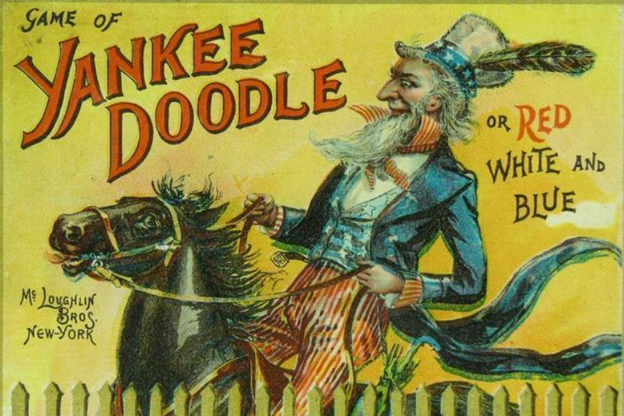What do such words as Itasca, Minnesota, Iowa and Texas have in common? They are all inventions, which have all become, dare I repeat myself, perfectly acceptable English words. [Chuck, Minnesota is not an invention; it’s essentially the Dakota word Mníssota.] As such, they are all evidence of our multiethnic history, and they are all contributions to our unicultural language, not to mention our unicultural history.


Chuck Chalberg: Yankee Doodle historian
I make fun of Chuck Chalberg from time to time. He is perhaps the greatest fabulist, Yankee Doodle (and home schooler) historian since Parson Weems. But today, I am just going to call him out for his racist, nativist op-ed printed in the Minnesota Star Tribune on Sunday, March 30th. It’s a long word salad entitled:
A multiethnic society is a blessing; a multicultural one is doomed
Really though, it’s just an apologia for this:
President Donald Trump has recently given his stamp of approval to the notion that English should be the official language of this country.
Halberg ruminates about how important the country’s founders felt a single language was. There is no mention of it in the Constitution, though. At the time of the founding of the United States, there were significant communities of Dutch, German, French, and Spanish speakers, as well as English. There were also many indigenous bands with their own languages. Apparently, John Adams proposed English as an official language, but it never went anywhere.
Chalberg’s piece was in fact a rebuttal to an op-ed published earlier criticizing Trump’s executive order on an official language which cited the many U.S. place names from other languages:
The author [of the earlier op-ed] unearthed the origins of multiple place names, some Native American, some French, some Spanish, some Latin, and some that were inventions borrowed from multiple sources.
Chalberg then whines:
To be sure, language is not the only important piece of our unicultural story. [America has never, ever been a unicultural story; you claim to be a historian, Chuck, surely you know that. Ed.] But it is a founding piece, and it should remain a permanent one. If it ceases to be either important or permanent, it will serve as a significant indication that the unraveling of America is well underway.
The notion that multiculturalism is a laudable goal for American society is itself evidence of our unraveling. After all, it suggests indifference about any single culture, even our [his?] own, maybe even especially our own. Which, come to think about it, may well be the point. [emphasis added]
Aye, Chuck, there’s the rub. Halberg undoubtedly believes in the Great Replacement Theory. Here’s the nut of the whole piece:
At the same time let’s remember — and preserve — America’s Judeo-Christian heritage. Heck, let’s remember — and celebrate — the Magna Carta and the founding documents of this country.
Chuck, many of the founders were Deists or agnostics. There is one founding document of the United States: the Constitution. People like Chalberg want to drag the Mayflower Compact and the Declaration of Independence in to it, but the Constitution supersedes and replaces everything.
Halberg waxes nostalgically about 19th Century public education:
In the late 19th century, as well as for a good chunk of the past century, we were quite aware of our good fortune and quite determined to be sensible. Migrants from all parts of Europe were streaming across the Atlantic to pursue the American dream, their own dreams or some combination thereof. Not all Americans welcomed these new dreamers, but many did — and for reasons quite similar to today: new voters and/or new workers. Besides, there was a largely empty country that needed to be populated
The public school system responded by adding Americanization to their list of educational responsibilities, which already included heavy doses of Protestantization. Then two creeds were put to work to promote and advance one culture. And today? Now the twin goals are to secularize and muticulturize, if such an English word exists. [My spell checker doesn’t think much of Protestantization, either. Ed.]
Chuck must yearn for the days of prayer in schools. It is easy to see why he is such a home schoolers’ favorite.
Chalberg is dead wrong about “welcoming these new dreamers.” It was a time of great xenophobia in the United States, especially with the influx of southern and eastern European immigrants. It was also the time of the Chinese Exclusion Act of 1882. In fact, the Pledge of Allegiance was dreamed up by Francis Bellamy as a virtual loyalty oath, a credo, to drill into school children. There is a good story at the link; I hope you will read it.
In conclusion — sweet words, I know, dear reader — I’ll just observe that English, particularly the 21st century version, is itself a kind of polyglot that has been borrowing and incorporating words for centuries. It is a model of diversity.
Thanks for your feedback. If we like what you have to say, it may appear in a future post of reader reactions.

